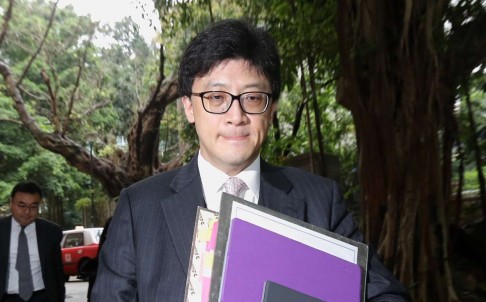Government fact-finding commission hears contrasting claims from lawyers for Housing Authority and builder
Key parties involved in last year’s tainted water scare continued to claim they had not been alerted to the health risks posed by excessive lead in drinking water, as a five-month-long probe into the incident came to an end on Thursday.
The scandal broke in June last year when tests showed tap water at Kai Ching Estate in Kowloon City contained amounts of lead exceeding World Health Organisation standards.But while the inquiry was not said to be determining which party was more blameworthy, a lawyer tasked with the fact-finding mission questioned whether the work culture of local government departments and authorities had contributed to the imbroglio.
READ MORE: ‘Three monkeys at top level of government’: lawyer calls out officials during tainted water inquiry
Government tests later found similarly high levels at several other public housing estates, prompting the government to set up the commission to investigate.
In making his closing submission on the last day of the inquiry, Dr Gerard McCoy SC, for contractor Paul Y., argued that the builder bore less responsibility than the Housing Authority, which developed the affected public housing estates.
He said the authority was in a better position to supervise the projects, given its resources and expertise.
There were “fundamental inadequacies” in theWater Supplies Department’s effort to ensure water safety, the lawyer added.

But Ambrose Ho Pui-him SC, for the authority, said the agency was also not alerted to the risks of excessive lead contained in the water.
Ho argued that the authority, without evading its responsibilities, had admitted its failures to discover regulations breaches for building materials and the consequences of banned materials being used.
In reviewing key points made by the parties at the inquiry, Paul Shieh Wing-tai SC, representing the commission of inquiry, said the regulators could have prevented the contamination from happening by simply tightening the relevant regulations in prior years.
READ MORE: Plumbers should have known materials containing lead were banned, Hong Kong’s water authority tells inquiry
“Every agency has its own weakness or blind spot,” said Shieh.
He declined to describe the regulators as shirking their responsibilities, but questioned whether the bodies had been too defensive in making their arguments at the inquiry.
“This inquiry is not supposed to deal with dereliction of duty or aim to claim scalps,” said Shieh.
The hearing before commission chairman Mr Justice Andrew Chan Hing-wai, which began in November last year, was to ascertain the causes of excess lead found in drinking water and issue recommendations by as early as May to ensure water safety.
http://www.scmp.com/news/hong-kong/law-crime/article/1926400/hong-kong-tainted-water-parties-maintain-they-were-unaware
